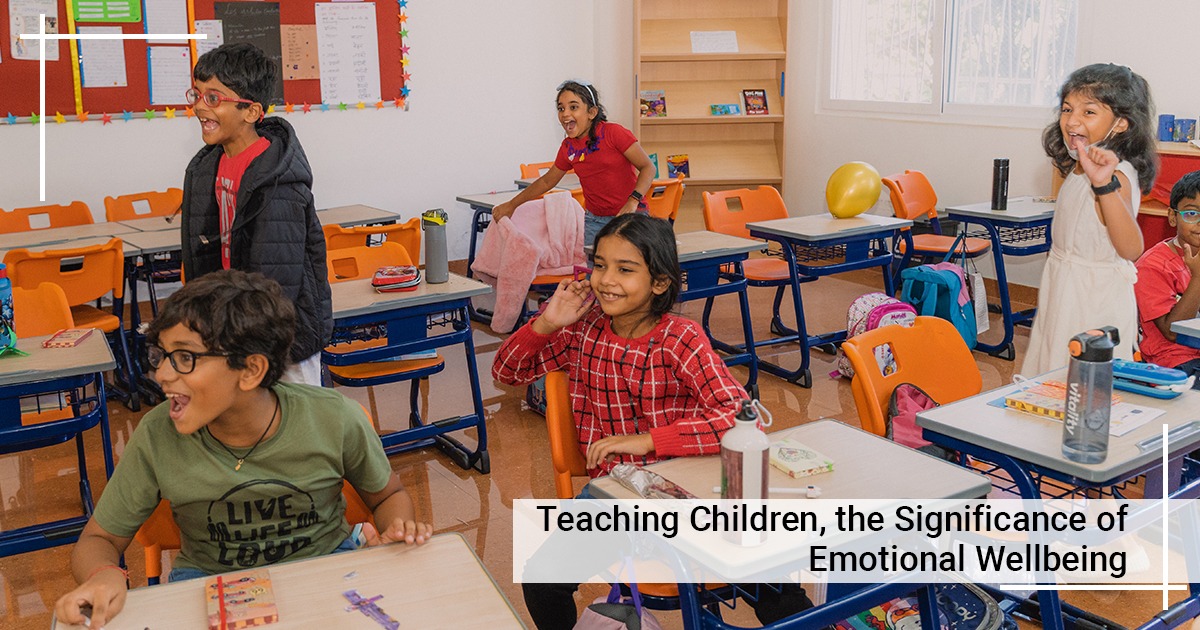Teaching Children, the Significance of Emotional Wellbeing

Emotional wellbeing has been identified as the key to discovering emotional pathways into the realm of self-awareness. As horrifying as the said statistics sound, suicide rates have seen a rampant increase in the recent times and mental health experts have reiterated that the lack of self-awareness within the emotional spectrum has proven to be the leading reasons of the same. It is only natural for parents today to be concerned about the aspect of mental health in their children as they grow up into the seemingly disturbed world that charts the disturbing numbers it does today.
Alongside academia, are schools and parents now looking at a glaring reality that demands them to invest time and energy into fueling their children with notions of mental wellness as they discover the various aspects of life? How significant is the lesson on emotional wellness in the developmental network of a young mind?
As the questions rattle on, studies have begun to demonstrate the merits of teaching children the various aspects of emotional wellness and the pivotal role that mental health plays in life. Here is a list of reasons you must ensure that your child is emotionally educated on the diverse aspects of mental wellbeing.
The Significance of Teaching School Children About Emotional Wellness
- 1. Enhances Social Skills –
To be able to prioritize emotional wellness is directly linked to prioritizing human life and individuals for their own distinct realities whether one can relate to them or not. Being sensitized about the emotional landscape in the self and in loved ones has long proven the positive effect it can have on an individual’s worldview about the collective emotional consciousness and thereby, the people that make for the society.
Children who learn the value of emotional positivity are able to navigate through their social interactions by recognizing the need to pass on the penchant of emotional wellbeing. Teaching students, the necessity of emotional wellbeing leads to traits of being well adjusted in their adulthood and over the years of their growing up. - 2. Motivation –
Lows are perhaps one of the most natural norms of being a human being. Over the course of life, every individual is susceptible to experiencing unfortunate emotional encounters with loss, pain, rejection, betrayal, and the likes of the same and negative emotions have the unfortunate power to reduce a perfectly healthy individual to experience mental states of lowered or demotivated sense of self-esteem
In the light of such an emotional upheaval, children who may be trained to be emotionally intelligent are better prepared to motivate themselves. Oftentimes as young adults, it is hard to find solace or comfort in interactions and relationships and to be self-reliant may take your child a long way. - 3. Empathy –
Conversations about empathy have taken over the various public discourses on mental health and the significance of empathy isn’t merely rooted in cultivating the ability to be socially reliable but has proven to be of great help in understanding the aspects of the self that demand compassionate introspection. Children who are taught to be empathetic are further likely to understand themselves through the lens of sensitivity. By addressing oneself with kindness, your child is allowed to find the strength to lend a helping hand when required.
Empathy renders your child ready for social interactions with accountability as far as passing on positive emotional tangents go. While it is not always possible or important to help another, it is crucial to ensure that one is not adding to the woes of another. Empathy sensitizes your child to the same. - 4. Self-Regulation –
Regulating one’s own emotional pathways may be one of the biggest strengths you can facilitate in your child’s developmental cortex; a one that is bound to seep into the depths of the branching in their growth. Children who can regulate their own emotions are able to achieve a sense of balance as adults with ease, pace, and by themselves. - 5. Self-Awareness –
Knowledge is key and when your child is aware of their own emotional highs and lows, they are likely to make informed choices. When your child encounters a negative emotion in a given circumstance despite their best efforts made, your child is able to avoid the trigger and therefore, a possible catastrophe and when they are pushed positively by a stimulus, they are presented with an opportunity to choose the circumstance that enables their growth.
When in need, awareness allows one to reach out to help before things spiral out of control and the same awareness facilitates the possibility of positive interactions.
Emotional wellbeing is key to a balanced life and the sooner your child learns the ways to prioritize their sensitivities, the sooner they are able to experience life for all the possibilities it has to offer.

